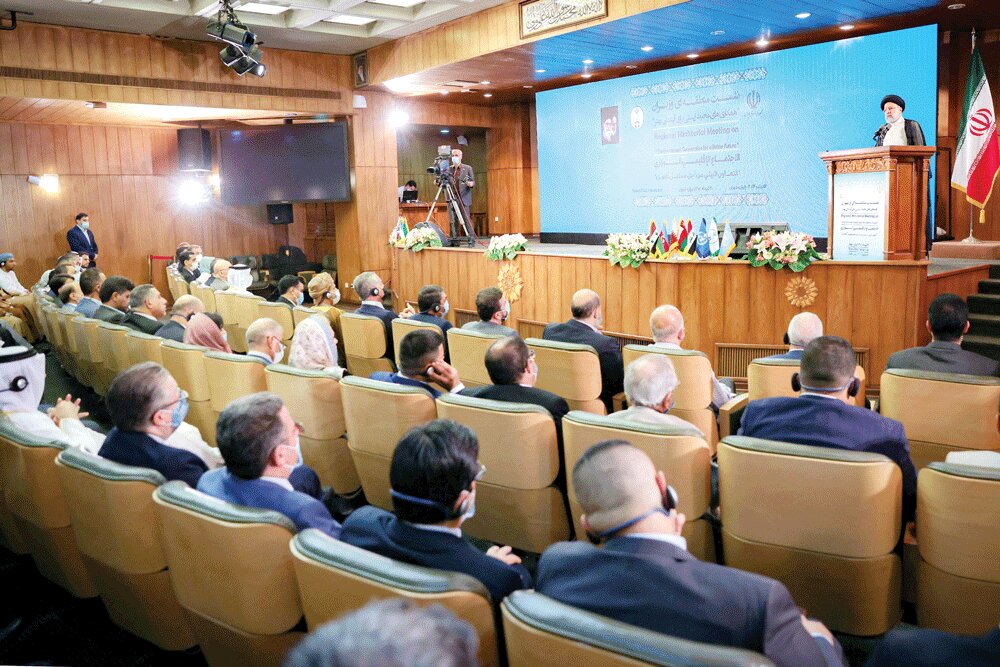Regional diplomacy for a better environment

TEHRAN – Tehran played host to a conference of ministers and officials from 11 countries, aiming to boost cooperation for resolving extant environmental problems, especially sand and dust storms.
Environment ministers of Iraq, Armenia, the United Arab Emirates, Oman, Syria, and Qatar, as well as deputy ministers of Azerbaijan and Turkmenistan along with delegations from Turkey and Uzbekistan, participated in the event which was held with the theme of “Environmental Cooperation for a Better Future.”
Addressing the opening ceremony, President Ebrahim Raisi emphasized that the preservation of the environment is essential and an inevitable priority.
Raisi had earlier obliged the department of environment to diligently pursue the solution of sand and dust storms through diplomacy and international forums, as well as interaction with neighboring countries.
“Conservation of the ecosystem and environment, which is a global concern, especially for countries of the region, is an inevitable priority today. If the environment is not safe and peaceful for people, the development will not be in its proper place and it will even become a threat to human health,” Raisi stated.
Industrial development is a necessity, but it is subordinate to the preservation of the environment, he emphasized.
Iraq, Armenia, the United Arab Emirates, Oman, Syria, Qatar, Azerbaijan, Turkmenistan, Turkey, and Uzbekistan participated in the event which was held with the theme of “Environmental Cooperation for a Better Future.” He further called on the regional countries to strive to mitigate the destructive environmental phenomenon, expressing satisfaction with the attention of neighboring countries to environmental protection.
“Iran is one of the leading countries taking steps toward environmental restoration as a requirement for social development, and environmental destruction, which is a result of social and political inequalities and improper use of nature and is an important factor in the violation of human rights.
The current world is facing many environmental problems beyond geographical and political borders, and the West Asian region is facing severe sand and dust storms.
Undoubtedly, the reduction of food and biological security, pollution, and excessive extraction of resources has led to the reduction of public health, and a negative impact on health and the economy,” he lamented.
The extravagance of the terrorist system and the deprivation of governments and nations of the region from the field of knowledge and technology in decision-making have caused environmental challenges, Raisi stressed.
On the other hand, the supremacist approach of the western governments in the past centuries, the unlimited encroachment on natural resources, especially in the countries under colonization, and the production of all kinds of pollutants in different parts of the world to achieve the current economic development have been the main factors, so there is an expectation that they will take more responsibility in this field, rather than this becoming a new path for neo-colonialism, the president explained.
Referring to some environmental challenges, including the increasing intensity of dust storms, as a transboundary issue, he noted that it requires international and regional determination to deal with this crisis and a mechanism to solve environmental issues.
Plans should be developed for the management and exploitation of water, air, soil, and waste management, he suggested, announcing readiness to share experiences and knowledge with neighboring countries to reduce pollution.
A union or an organization for environmental cooperation of West Asian countries should be formed to organize the required measures. Also, the establishment of a regional fund for financial support is necessary to achieve the goals of the UN resolutions, he highlighted.
Ali Salajegheh, the head of the Department of Environment, for his part, said that the issue of the environment is an all-encompassing and cross-border issue that either stabilizes or challenges the life elements.
Unfortunately, environmental hazards have increased significantly today and have affected people's lives across the world, he added.
The creation of a regional environmental organization, a secretariat, and an expert group to follow up on the approvals of the meeting are on the agenda, he stated.
The purpose of the meeting is to create convergence to find a solution to SDSs mitigation through new technologies and knowledge-based methods, although the meeting covers all environmental issues, it specifically deals with the issue of dust storms, he explained.
Sometimes, sanctions have made international organizations not fulfill their duties, he lamented, calling the United Nations to continue support in this regard.
SDS effects
The SDSs phenomenon has been plaguing the country for several years and has caused problems in many provinces. According to experts, natural and human factors are involved in the occurrence and severity of this phenomenon which is mainly caused by excessive consumption of water and drying up reservoirs.
The internal dust sources are estimated at 34.6 million hectares, generating an average amount of 4.22 million tons of dust per year, about 1.460 million hectares are dried wetlands.
Some 4.23 million tons of dust are raised per year, which means the loss of soil fertility will hit the agricultural sector.
All the SDSs sources are not located in Iran, 300 million hectares in the neighboring countries are giving rise to SDSs, which transport dust into Iran. The total dust density is estimated at about 150 million tons.
In fact, the dust is raised from Turkmenistan, Uzbekistan, Afghanistan, and Pakistan in the northeast as well as Iraq, Syria, Saudi Arabia, and Jordan in the south, southwest, and west.
Letizia Rossano, the director of the Asian and Pacific Centre for the Development of Disaster Information Management (APDIM), said in June that Iran is really at forefront of understanding the problem of sand and dust storms as well as dealing with it.
More than 80 percent of the entire populations of Turkmenistan, Pakistan, Uzbekistan, Tajikistan, and the Islamic Republic of Iran are exposed to medium and high levels of poor air quality due to sand and dust storms," she noted.
FB/MG
